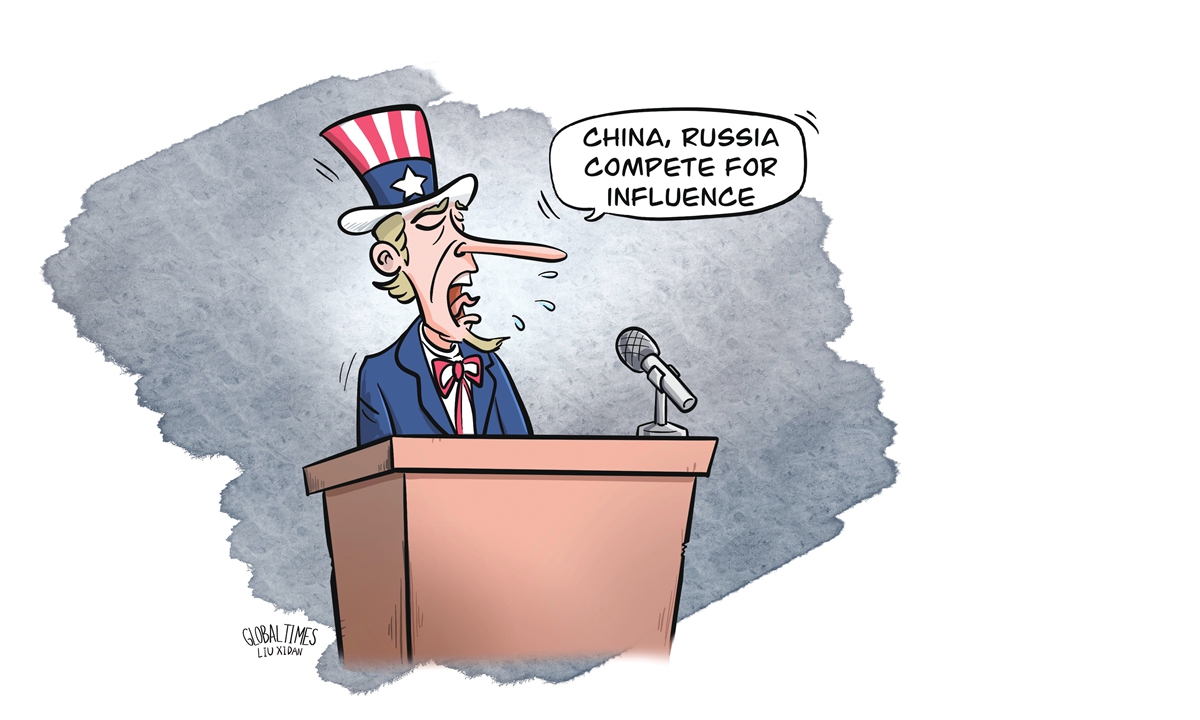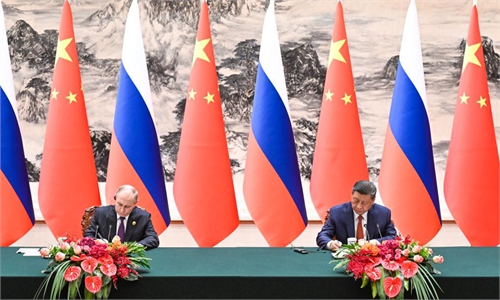
Illustration: Liu Xidan/GT
Just before Russian President Vladimir Putin's state visit to China in his new term, the Carnegie Center published an article interpreting China's deepening cooperation with Central and Eastern European (CEE) countries as China "stealing" Russia's influence. This kind of propaganda masks the reality that more and more countries, such as Serbia and Hungary, are unwilling to align with the West. This is just a new version of sowing discord between China and Russia, using the falsehood of "China snatching Russia's partners" to provoke tensions between China and Russia.
First of all, this rhetoric diminishes the status of CEE countries.
We definitely do not agree with the worldview of US Secretary of State Antony Blinken: "If you're not at the table in the international system, you're going to be on the menu." CEE countries are not delicious dishes for great powers to enjoy. Countries, regardless of size, have the right to choose their own partners and their own paths. CEE countries have never been willing to be mere pawns in the game of great powers, at least not Serbia or Hungary. After the outbreak of the Russia-Ukraine conflict in 2022, faced with pressure from the Western camp, they did not choose to side with Ukraine and the West, nor did they cut off cooperation with Russia. In Hungary, Prime Minister Viktor Orban is seen as being against providing assistance to Ukraine and escalating the conflict within NATO and the EU. Despite the demonization of China in the US for the presidential election, Serbia, Hungary, and even France, still see that cooperation with China greatly serves their national interests and well-being. They are willing to receive China at a high level and open their markets to China's industrial chain.
Why don't Serbia and Hungary align with Europe? Perhaps it is not just because Serbia and Hungary are unwilling to be manipulated by great powers. More importantly, Europe has not been able to provide them with what they expect. The murky political correctness atmosphere in Europe is not what they need. And the manufacturing industry supply chain they need is not something that Europe, which has long been immersed in the non-real economy, can offer. Serbia, Hungary and other countries are seeing the downward trend in Europe and choosing a distant partner over aligning with their neighbors. Isn't this the tragedy of Europe?
Furthermore, no matter how the West tries to sow discord, it will not change the overall trend of a stable and healthy development of China-Russia relations. From the idea that China-Russia relations are a "marriage of convenience" to Tucker Carlson's question of whether Russia is worried about China dominating the BRICS organization economically, these narratives are dismissed by President Putin as "bogeyman stories." China and Russia are both well aware of the Western agenda to sow discord between them and are increasingly reluctant to respond.
The facts prove that China-Russia relations have not been affected by Western noise. During President Putin's visit to China, the leaders of China and Russia jointly signed and issued a joint statement on deepening the China-Russia comprehensive strategic partnership of coordination for a new era on the occasion of the 75th anniversary of the establishment of diplomatic ties between the two countries. By carrying out cooperation for the benefit of both countries and their peoples, this is the fundamental driving force of China-Russia relations. During President Putin's visit to China, China and Russia signed multiple bilateral cooperation agreements, which will further promote the development of the bilateral relationship.
Isn't it clear to Western elites that this kind of sowing discord is meaningless? They must know that they are powerless in the face of the stable relationship between China and Russia and can only resort to creating noise out of frustration. The more intense the Western attacks on China-Russia relations, the more they demonstrate the contemporary significance of this relationship. During the period of high-level cooperation between China and Russia, we witnessed that the Western forces led by NATO cannot replicate what they did in former Yugoslavia and Iraq, nor can they abuse mechanisms such as the UN Security Council to bully weaker countries. Therefore, calling China-Russia relations a key factor in maintaining the contemporary international order is reasonable, as the stability of this relationship ensures that the West adheres to the rules they themselves created.
We cannot stop the West from constantly creating new versions of provocative rhetoric, but the West's provocations make us more aware of the value of maintaining China-Russia relations.
The author is a scholar from the Shanghai-based China National Institute for SCO International Exchange and Judicial Cooperation. opinion@globaltimes.com.cn


